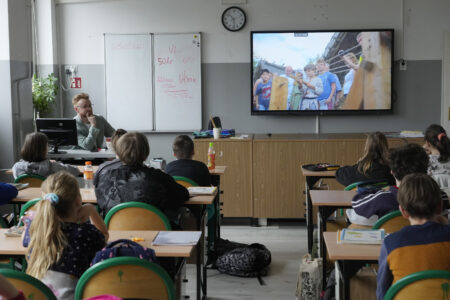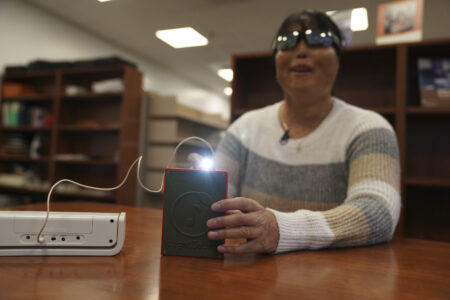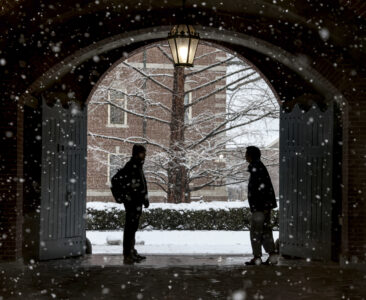Music videos become tool to boost learning, test scores
NASHVILLE, Tenn. (AP) — Sixth-grade math teacher Christina Nuchols watched recentlyas one of her students walked through the hall singing a song about decimals.
Her students at Whittle Springs Middle School, a Title I low-income school in Knoxville, are often the ones who don’t do their homework, Nuchols said.
But due in part to Muzology, a new program that sets math principles to popular music, Nuchols’s students are excited about pre-algebra.
The program was tested in Knoxville and as of this school year, is being used in Cheatham County Schools, Fayette County Schools, Saint Matthew Catholic School and has recent interest from schools in Memphis.
“They really get this,” said Nuchols of her students. “They like that the music is the stuff that they’re used to hearing. It just really connects with them.”
Pioneered by researcher and CEO Lana Israel and Garth Brooks’ manager Bob Doyle on Music Row in Nashville, Muzology uses music videos to boost comprehension and test scores.
The web-based program works to trigger memory, emotion, motivation and attention — four critical areas of the brain related to successful learning. Israel, who earned her doctorate from the University of Oxford in England as a Rhodes Scholar, assembled a team of professional songwriters and producers to ensure the artistic aspect of the learning tool was contemporary and relevant.
“We created Muzology because we knew that while many students struggled with learning and checked out of the learning process, the same students knew the words to countless pop songs,” Israel said. “We said, ‘What if we assemble a team … and create a comprehensive and iterative series of music videos that teach an entire subject.”
After two years of being used in select school districts around the country, the National School Boards Association selected Muzology, LLC as one of six companies for its annual Technology Innovation Showcase.
In addition, Muzology was just awarded a National Science Foundation Small Business Innovation Research grant to conduct research and development work on optimizing music for learning.
“The National Science Foundation supports small businesses with the most innovative, cutting-edge ideas that have the potential to become great commercial successes and make huge societal impacts,” Barry Johnson, director of the NSF’s Division of Industrial Innovation and Partnerships, said in a statement. “We hope that this seed funding will spark solutions to some of the most important challenges of our time across all areas of science and technology.”
Israel chose pre-algebra as the first subject to target because, she said, the subject is an acute pain point and is directly linked to high school graduation rates.
But she and Doyle plan to expand Muzology to include lessons in other subjects. Israel will use the NSF grant for more research in hopes of uncovering an algorithm that clarifies the characteristics of a song that is optimal for learning.
“There are a number of variables that are in the mix that may influence the songs’ efficacy from a learning perspective and there may be others that don’t,” she said. “There may be characteristics we find that don’t make a difference but that when it gets to a certain point it makes a significant difference and it could be rhythmic or meter or tonal. There’s a lot to unpack.”
Muzology just finished a pilot program in Hillsboro County public schools in Tampa, Florida, added a school district outside of Philadelphia, and is in talks with schools and school districts in Texas, Florida, California, Illinois, Virginia, Ohio, Louisiana, Montana, Alabama, Kansas, Minnesota, Utah and South Carolina. The program has been used by more than 200 schools across the country.
The videos go beyond rote memorization to engage learners, get students excited about math, and teach foundational math skills, concepts and procedures.
The feedback the Muzology team continues to receive from students, Israel said, indicates emotional and affirming results, similar to what Nuchols noted in her classroom.
“We’re seeing amazing transformations in students,” she said. “We’re seeing students who were coming into summer school programs saying they were dumb, hated math and didn’t want to go to college. Four weeks later, we see those very same students who after learning Muzology, say, ‘I love math, it’s my favorite subject.'”
Nuchols notes that while she can’t prove Muzology is the only factor, that since putting the program in place, the highest rank assigned in Tennessee.
She began using Muzology as math warm-ups, then she gave students the option of watching it during their free time, which not only helped them retain the math rules but also kept them out of trouble. During particularly busy times of the year, Nuchols lets students watch Muzology in place of missing assignments. If they do well on the assessment, she lets the video take the place of the school work.
“They’d ask me why, and I’d joke, ‘Because I’m brainwashing you,'” she said. “I told them, ‘I want you singing these songs when you wake up in the morning.'”
Nuchols learned the songs and incorporated their lyrics into her notes so her students would see her write the lyrics, then watch it in a video for reinforcement.
“It was really, really cool how I was able to integrate that,” she said. “I would use it as an introductory, a reinforcement, an incentive or as a bonus. I know the times I have the least amount of behavior issues is when I let them use Muzology because they like it and invest in it.”
Over the course of the 2017 academic school year spanning use by thousands of students, in-platform pre-test scores averaged 45 percent. After watching a Muzology video, the first-time students attempted an in-platform post-test, the average score increased to 72 percent with the most frequently occurring post-test score being 100 percent. “I tell the kids that math is a lot like video games,” Nuchols said. “I hate video games because I don’t have time to learn the rules. Math is the same way. If you don’t like math, it’s because you haven’t learned the rules of the game. Muzology is a fun way to help you remember the rules.”
Doyle and Israel want the program to illustrate the connection between the arts and learning.
“We’re hoping to build a bridge between science and music and say that what songwriters and artists create has very important scientific ramifications in helping people meet their goals and actualize their potential and educate themselves,” Israel said. “That is really exciting.”
Information from: The Tennessean, http://www.tennessean.com





